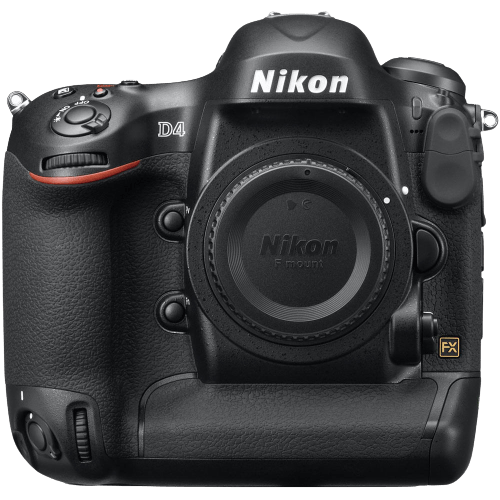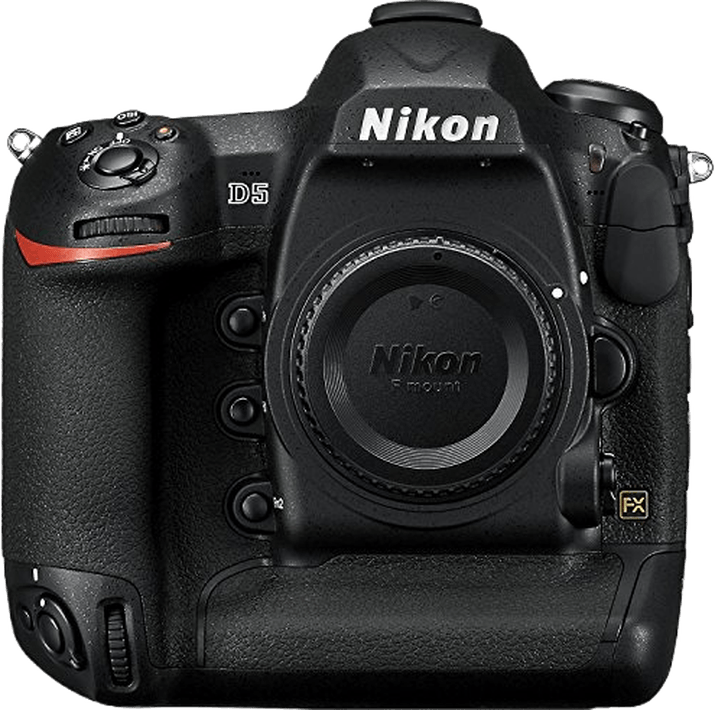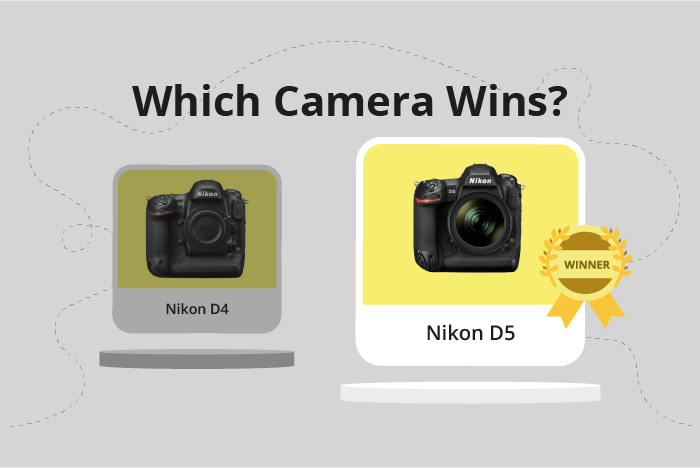Nikon D4 vs D5 Comparison
Nikon D4

Nikon D5

The Nikon D5 takes the lead with a score of 74/100, while the Nikon D4 trails behind at 63/100. Both DSLR cameras share similar dimensions, with the D4 measuring 160 x 157 x 91mm and weighing 1340g, and the D5 measuring 160 x 159 x 92mm and weighing 1415g.
The Nikon D5 excels with its higher score, justifying its higher launch price of $6500 compared to the D4’s $5999. Despite being released four years apart, both cameras maintain a consistent design and build quality. The D4, however, holds an advantage in being slightly lighter than the D5, potentially making it easier to handle during long shooting sessions.
Taking all factors into account, the Nikon D5 emerges as the superior choice due to its improved performance. The Nikon D4, while still a reliable option, is outperformed by its successor.
Nikon D4 vs D5 Overview and Optics
The Nikon D5 emerges as the winner in our optics comparison with a score of 72/100, while the Nikon D4 garners a respectable 63/100. Both cameras share several common specifications, including a CMOS sensor, full-frame sensor size, Nikon F lens mount, and the absence of image stabilization. Despite these similarities, the D5 outperforms the D4 in certain aspects, contributing to its higher score.
The D5 boasts a higher megapixel count of 20.8 compared to the D4’s 16.2, allowing for greater image detail and improved cropping flexibility. Furthermore, the D5’s shooting speed is slightly faster at 12 frames per second, compared to the D4’s 11 frames per second, which can be advantageous for capturing fast-moving subjects or action scenes. The D5 also benefits from an upgraded processor, the Expeed 5, providing faster performance and better noise reduction in low light conditions.
Although the D5 takes the lead in most categories, the D4 holds a slight advantage in one area: its DXOMARK sensor score. The D4 scores 89, while the D5 trails at 88, indicating that the D4 may provide marginally better image quality in certain situations. However, this small difference is unlikely to be discernible in most practical applications.
Ultimately, the Nikon D5’s superior megapixel count, shooting speed, and processor make it the better choice for those prioritizing optics performance. While the Nikon D4 does have a marginally higher DXOMARK sensor score, it falls short in other critical areas, making the D5 a more compelling option for photographers seeking enhanced image quality and speed.
Nikon D4 vs D5 Video Performance
The Nikon D5 emerges as the superior camera in terms of video capabilities, with a score of 70/100, compared to the Nikon D4, which scores 57/100. Both cameras share some common specifications, including a maximum video frame rate of 30fps and built-in time-lapse functionality.
The Nikon D5 outperforms the D4 in video resolution, offering 4K resolution with dimensions of 3840 x 2160, while the D4 only provides Full HD resolution with dimensions of 1920 x 1080. This higher resolution allows the D5 to capture more detail and produce higher-quality video content, making it a better choice for videographers and professionals in need of top-notch video performance.
On the other hand, the Nikon D4 does not surpass the D5 in any specific video aspect. However, its Full HD resolution might be sufficient for users who are not looking for the highest video quality, and its lower price point could make it a more attractive option for those on a budget or those who prioritize still photography over video.
Taking these points into consideration, the Nikon D5 is the clear winner when it comes to video capabilities, with its 4K resolution providing superior video quality. The Nikon D4, while not excelling in any particular video aspect, may still be a suitable choice for those who do not require the highest video performance or are focused more on still photography.
Nikon D4 vs D5 Features and Benefits
The Nikon D5 emerges as the winner in the features comparison, scoring 74 out of 100, while the Nikon D4 scores 57. Both cameras share some specifications, such as a 3.2-inch screen size, no flip screen, no GPS, and no Bluetooth. However, the Nikon D5 outperforms the D4 in several aspects.
The D5’s screen resolution is significantly higher, at 2,359,000 dots, compared to the D4’s 921,000 dots. This results in a sharper and clearer display for the D5, making it easier to review and edit images on the camera itself. Additionally, the Nikon D5 has a touchscreen, which the D4 lacks. This feature allows for more intuitive navigation and control, as well as easier focus point selection.
Another advantage of the Nikon D5 is its built-in Wi-Fi capability, which the D4 does not have. This feature enables the user to transfer photos and control the camera remotely via a smartphone or tablet, providing more flexibility and convenience in various shooting situations.
Despite its lower feature score, the Nikon D4 may still be a suitable choice for some photographers, especially those who prioritize simplicity and do not require the additional features offered by the D5. The D4’s lower score does not necessarily mean it is an inferior camera, but rather that it lacks certain features that the D5 possesses.
To conclude, the Nikon D5 offers a higher feature score, a better screen resolution, a touchscreen, and Wi-Fi capabilities, making it the superior choice in terms of features. The Nikon D4, while lacking these additional features, may still serve photographers well who do not require these extras.
Nikon D4 vs D5 Storage and Battery
The Nikon D4 and Nikon D5 both score 87/100 in storage and battery. They share common specs, such as having two memory card slots and accepting Compact Flash and XQD cards. Neither camera has USB charging capabilities.
The Nikon D5 surpasses the D4 in battery life, offering 3780 shots compared to the D4’s 2600 shots, due to its improved battery type, the EN-EL18a. This longer battery life provides an advantage for photographers who require extended shooting periods without needing to change batteries.
The Nikon D4, however, does not have any notable advantages over the D5 in terms of storage and battery. Both cameras perform equally in this aspect, aside from the D5’s superior battery life.
Considering these points, the Nikon D5 proves to be a better choice for those who prioritize longer battery life, while the Nikon D4 remains a reliable option for photographers who are satisfied with its battery performance.
Nikon D4 vs D5 – Our Verdict
Are you still undecided about which camera is right for you? Have a look at these popular comparisons that feature the Nikon D4 or the Nikon D5:

